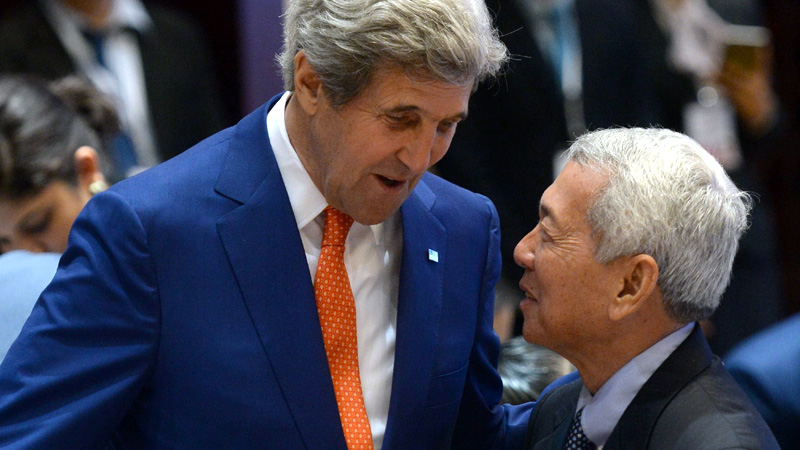China claims win; PH lets go of bid to cite sea ruling

KERRY AND YASAY US Secretary of State John Kerry talks with Philippine Foreign Secretary Perfecto Yasay in Vientiane. AFP
VIENTIANE—Southeast Asian nations overcame days of deadlock on Monday when the Philippines dropped a request for their joint statement to mention a landmark legal ruling on the South China Sea, officials said, after objections from Cambodia.
China publicly thanked Cambodia for supporting its stance on maritime disputes, a position that threw the Association of Southeast Asian Nations (Asean) weekend meeting in the Laos capital of Vientiane into disarray.
Competing claims with China in the vital waterway are among the most contentious issues for Asean, with its 10 members pulled between their desire to assert their sovereignty while finding common ground and fostering political and commercial ties with Beijing.
China claims almost all of the South China Sea, but four Asean members—the Philippines, Vietnam, Malaysia and Brunei—all have rival claims. Taiwan is a sixth claimant.
In a ruling by the UN-backed Permanent Court of Arbitration in The Hague on July 12, the Philippines won an emphatic legal victory over China on the dispute.
Article continues after this advertisementThe Philippines and Vietnam both wanted the ruling, which denied China’s sweeping claims in the strategic waterway that channels more than $5 trillion in global trade each year, and a call to respect international maritime law to feature in the communiqué.
Article continues after this advertisementCalling for bilateral discussions, Cambodia opposed the wording on the ruling, diplomats said.
Ruling praised
The Philippines’ Foreign Secretary Perfecto Yasay praised the ruling during an emergency postbreakfast meeting on Monday, called by Laos to try to break the foreign ministers’ deadlock over the statement.
“The decision has provided a solid legal foundation on which a rules-based approach for resolving disputes in the South China Sea can be built,” Yasay said he told his Asean counterparts, adding the ruling was “final and binding [on] all parties concerned, is a clearly established fact” and that it had “significant implications for the entire region, not just the coastal states bordering the South China Sea.”
An Asean statement, Yasay said, backing the legal and diplomatic processes being pursued by the Philippines will not only reflect Asean respect for a rules-based order, but also reaffirm Asean’s “centrality and solidarity in the regional security architecture.”
But Yasay stopped short of calling for Chinese compliance with the landmark ruling.
Manila agreed to drop the reference to the ruling in the communiqué, one Asean diplomat said, in an effort to prevent the disagreement leading to the group failing to issue a statement.
Peaceful resolutions
The watered-down communiqué referred instead to the need to find peaceful resolutions to disputes in the South China Sea in accordance with international law, including the United Nations Convention on the Law of the Sea (Unclos), to which the court ruling referred.
“We remain seriously concerned about recent and ongoing developments and took note of the concerns expressed by some ministers on the land reclamations and escalation of activities in the area, which have eroded trust and confidence, increased tensions and may undermine peace, security and stability in the region,” the Asean communiqué said.